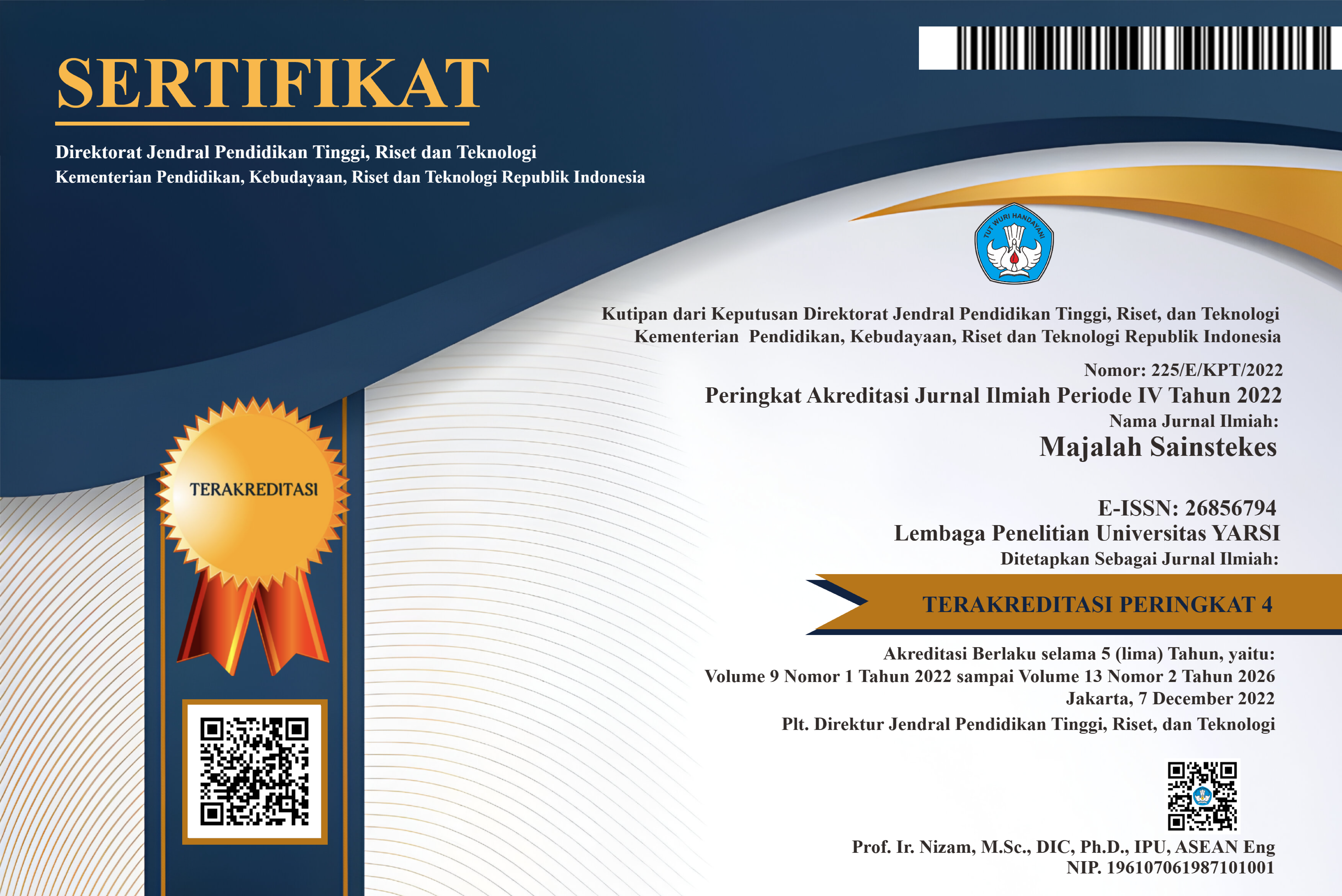Strategi Penatalaksanaan Stomatitis Aftosa Rekuren pada Anemia Defisiensi Besi (Laporan Kasus)
Keywords:
recurrent aphthous stomatitis, iron deficiency, anemia, managementAbstract
Recurrent aphthous stomatitis (RAS) is a type of lesion of the oral mucous consisting of sudden acute, painful, being recurrent, non-infectious, non- vesicular, and immunologically mediated. Chronic iron deficiency will result in iron deficiency anemia which is one of RAS predisposing factors. To ilustrate the complexity of RAS in iron deficiency anemia following the treatment strategies. Case Report: Outpatient woman, thirty years old, not married yet; came with painful aphthous on her tongue causing stiff tongue sensation and difficult to speak. She has frequent aphthous since last two months. Case Management: Diagnosis of RAS was derived from history and clinical presentation whereas iron deficiency anemia condition was derived from hematology examination. Patient has been instructed to increase iron source diet and limit tea consumption. Chlorhexidine gluconate and bee propolis were used as RAS medication. Ferro gluconate, ferrazone, and ascorbic acid were delivered as iron deficiency therapy. RAS treatment in iron deficiency anemia has to be considered both of RAS and iron deficiency condition related to their correlation.References
Abdulsalam M, Daniel A. Diagnosis, Pengobatan dan Pencegahan Anemia Defisiensi Besi. Sari Pediatri 2002;4(2):74 - 77.
Aliyah S. Kadar Zat Besi Dalam Darah Pasien Stomatitis Aftosa Rekuren di Klinik Penyakit Mulut RSCM [Tesis]. Universitas Indonesia, 1993.
Altenburg A, Abdel-Naser MB, Seeber H, Abdallah M, Zouboulis CC. Practical Aspects of Management of Recurrent Aphthous Stomatitis. JEADV 2007;21:1019-26.
Alton I. Iron Deficiency Anemia. In: Stang J, Story M, editors. Guidelines for Adolescent Nutrition Services. Minneapolis: Center for Leadership, Education, and Training in Maternal and Child Nutrition, Division of Epidemiology and Community Health, School of Public Health, University of Minnesota, 2005:101-08.
Andrews NC. Iron Metabolism: Iron De?ciency and Iron Overload. Annu Rev Genomics Hum Genet 2000;01:75–98.
Boras VV, Savage N. Recurrent Aphthous Ulcerative Disease: Presentation and Management. Australian Dental Journal 2007;52(1):10-15.
Broome CV, Marks JS, Dietz WH. Recommendations to Prevent and Control Iron Deficiency in the United States. Atlanta: U.S. Department of Health and Human Services Centers for Disease Control and Prevention (CDC), 1998:1-29.
Fernandez R, Tuckey T, Lam P, Allidina S, Sharifi S, Nia D. The Best Treatment for Aphthous Ulcers: University of Toronto, Canada, 2006:1-4.
Gabrielli GB, Sandre GD. Excessive Tea Consumption can Inhibit the Efficacy of Oral Iron Treatment in Iron-Deficiency Anemia. Haematologica 1995;80:518-20.
Ghafoor F, Khan AA. Association of Vitamin B12, Serum Ferritin and Folate Levels with Recurrent Oral Ulceration. Pak J Med Res 2012;51(4):132-35.
Hill M, Moore RL. Locally Acting Oral Chemotherapeutic Agents. In: Rose LF, Mealey BL, editors. Periodontics: Medicine, Surgery, and Implants. St Louis, Missouri: Mosby, 2004:276-87.
Jurge S, Kuffer R, Scully C, Porter SR. Recurrent Aphthous Stomatitis. Oral Diseases 2006; 12:1-12.
Kahl C, Cleland JA. Visual Analogue Scale, Numeric Pain Rating Scale, and the McGill Pain Questionnaire: an Overview of Psychometric Properties. Physical Therapy Reviews 2005; 10:123-28.
Kolahi J, Soolari A. Rinsing with Chlorhexidine gluconate Solution after Brushing and Flossing Teeth: A Systematic Review of Effectiveness. Quintessence Int 2006;37:605–12.
Koybasi S, Parlak AH, Serin E. Recurrent Aphthous Stomatitis: Investigation of Possible Etiologic Factors. American Journal of Otolaryngology Head and Neck Medicine and Surgery 2006;27:229-32.
Miller MF, Garfunkel AA, Ram CA, Ship II. The Inheritance of Recurrent Aphthous Stomatitis. Observation on Susceptibility. Oral Surg Oral Med Oral Pathol 1980;49(5):409-12.
Nolan A, Baillie C, Badminton J, Rudralingham M, Seymour RA. The Efficacy of Topical Hyaluronic Acid in the Management of Recurrent Aphthous Ulceration. J Oral Pathol Med 2006 35:461–5.
Porter SR, Scully C, Flint S. Hematologic Status in Recurrent Aphthous Stomatitis Compared with Other Oral Disease. Oral Surg Oral Med Oral Pathol 1988;66(1):41-4.
Provan D. Mechanisms and Management of Iron Deficiency Anaemia. British Journal of Haemalology 1999;105 (Supplement 1):19-26.
Rodr?guez M, Rubio JA, Sanchez R. Effectiveness of Two Oral Pastes for the Treatment of Recurrent Aphthous Stomatitis. Oral Diseases 2007;13:490-94.
Sacher RA, McPherson RA. Penyakit Sel Darah Merah. In: Hartanto H, editor. Tinjauan Klinis Hasil Pemeriksaan Laboratorium. 11 ed. Jakarta: EGC, 2004:67-108.
Samet N, Laurent C, Susarla SM, Samet-Rubinsteen N. The Effect of Bee Propolis on Recurrent Aphthous Stomatitis: A Pilot Study. Clin Oral Invest 2007;11:143-47.
Scully C, Porter S. Oral Mucosal Disease: Recurrent Aphthous Stomatitis. British Journal of Oral and Maxillofacial Surgery 2008;46:198-206.
Sherwood L. Sitem Pencernaan. In: Santoso BI, editor. Fisiologi Manusia: Dari Sel ke Sistem. 2 ed. Jakarta: EGC, 1996:537-89.
Shohat-Zabarski R, Kalderon S, Klein T, Weinberger A. Close Association of HLA-B51 in Persons with Recurrent Aphthous Stomatitis. Oral Surg Oral Med Oral Pathol 1992; 74(4):455-8.
Shruthi L, Pushparaja S, Bhavna P. Role of Copper and Iron Deficiencies in Pathogenesis of Recurrent Aphthous Ulcer. Int Res J Pharm 2013;4(5):219-21.

 Ahmad Ronal
Ahmad Ronal












